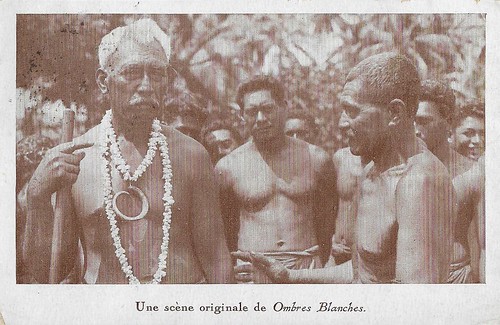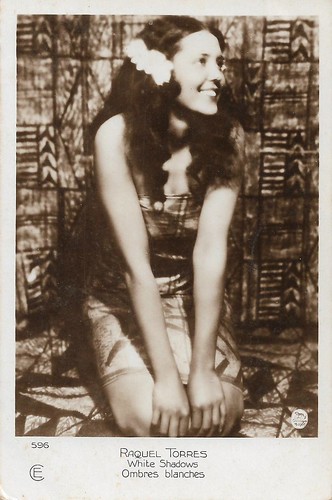White Shadows in the South Seas (W.S. Van Dyke, Robert Flaherty, 1928) started a series with exotic films in which Western pioneers travelled to Polynesian islands or other far-away places. In White Shadows in the South Seas, Monte Blue starred as the traveller and Raquel Torres debuted as the beautiful island girl he falls in love with. The film was shot on Tahiti, 4000 miles from Hollywood, a rarity for the time.

German postcard. Ross Verlag, Berlin, no. 110/1. Photo: Metro-Goldwyn-Mayer. Monte Blue and Raquel Torres in White Shadows in the South Seas (W.S. Van Dyke, Robert Flaherty, 1928).

German postcard by Ross Verlag, Berlin, no. 110/2. Photo: Metro-Goldwyn-Mayer. Monte Blue and Raquel Torres in White Shadows in the South Seas (W.S. Van Dyke, Robert Flaherty, MGM 1928).

German postcard by Ross Verlag, no. 110/5. Photo: Metro-Goldwyn-Mayer. Raquel Torres in White Shadows in the South Seas (W.S. Van Dyke, 1928).

German postcard by Ross Verlag, no. 110/6. Photo: Metro-Goldwyn-Mayer. Monte Blue in White Shadows in the South Seas (W.S. Van Dyke, Robert Flaherty, 1928).
In White Shadows in the South Seas (W.S. Van Dyke, Robert Flaherty, 1928), Monte Blue plays Dr. Matthew Lloyd, an alcoholic doctor who is disgusted by the way white men have cheated, robbed and exploited the trusting natives of the Polynesian Islands. He makes an enemy of Sebastian (Robert Anderson), an evil trader, who manages to get Lloyd on to a plague-ridden boat, which, during a typhoon, is shipwrecked on another uncharted island. The Pacific island is still untouched by the 'white shadows', and Lloyd falls in love with native girl Fayaway (Raquel Torres).
When Lloyd rescues the chief's young son from drowning the island people make him a God. Enchanted by the idyllic lifestyle of the islanders, Lloyd reacts with horror when he sees Sebastian's group sail into view, bringing their usual seductive trinkets of alcohol and cigarettes. Attempting to quell the invasion, Blue is killed by one of Sebastian's men. As her island falls victim to civilisation, Fayaway mourns over her lover's grave.
In 1927, MGM production head Irving Thalberg was in the hospital recuperating and during his stay he read the travel book 'White Shadows in the South Seas' by Frederick O'Brien, who had spent a year in the South Pacific with Marquesas Islanders. Thalberg decided to make O'Brien's book into an epic adventure film and he selected Robert Flaherty, a famed documentary maker, to direct. Thalberg had been very impressed with his documentary Moana (1926). W.S. Van Dyke, who had mainly worked on Westerns, was named as assistant director. The film began production in 1927 as a co-venture between Flaherty, Cosmopolitan and MGM.
White Shadows in the South Seas was filmed on location in Tahiti, even though the opening credits claim it was shot on location in the Marquesas Islands with "authentic" islanders. Robert Flaherty had plenty experience with the South Seas: he had lived with his wife and children in Samoa from April 1923 to December 1924 filming Moana. He was at first given complete artistic control, but he began to falter in terms of keeping cast and crew organised.
For Metro-Goldwyn-Mayer, White Shadows was a special project. It was to be MGM's first sound film, with a pre-recorded soundtrack, and the first film in which Leo, the MGM lion roared during the introduction. The soundtrack consisted of a romantic score by William Axt and David Mendoza, with a few sound effects such as wind howling, a storm, trees ruffling and one faint word "Hello".
Flaherty moved too slowly to suit MGM. More and more directorial authority was relegated to Flaherty's assistant, the phenomenally fast W. S. Van Dyke who was known as "One Take Woody", and would go on to an Oscar nomination for The Thin Man (1934). Frustrated, Flaherty resigned although some reports claim that he fell ill and was taken off the project. The film became solely the responsibility of Van Dyke.
The cinematographer was Clyde De Vinna, whose beautiful, vivid photography justly won the Oscar for Best Cinematography. There are some awesome underwater sequences, featuring octopuses, sharks, pearl-diving and an unforgettable, intimate scene in which the 'white god' teaches the island girl to whistle.
Hal Erickson at AllMovie: "Despite the wails from the pro-Flaherty camp about "compromise" and "bastardization", the finished White Shadows in the South Seas is a superlative work. Loosely based on a 1919 book by Frederick O'Brien, the film charts the denigration of the South Sea islands and its denizens thanks to the intervention of white civilization. (...)
Gorgeously photographed, White Shadows in the South Seas is a masterful blend of drama and documentary. Most surviving prints do not include the clumsily constructed talkie sequences, wherein Monte Blue teaches Raquel Torres how to whistle (this scene works far better when conveyed silently)."

French postcard for the Parisian Ciné Madeleine. Photo: Metro-Goldwyn-Mayer. Monte Blue and Raquel Torres in White Shadows in the South Seas (W.S. Van Dyke, Robert Flaherty, 1928).

French postcard for the Parisian Ciné Madeleine. Photo: Metro-Goldwyn-Mayer. Nonprofessional actors from Tahiti in White Shadows in the South Seas (W.S. Van Dyke, Robert Flaherty, 1928).

French postcard by Cinémagazine-Editions, no. 596. Photo: Metro-Goldwyn-Mayer. Raquel Torres in White Shadows in the South Seas (W.S. Van Dyke, Robert Flaherty, 1928).
Source: Hal Erickson (AllMovie), Wikipedia and IMDb.

German postcard. Ross Verlag, Berlin, no. 110/1. Photo: Metro-Goldwyn-Mayer. Monte Blue and Raquel Torres in White Shadows in the South Seas (W.S. Van Dyke, Robert Flaherty, 1928).

German postcard by Ross Verlag, Berlin, no. 110/2. Photo: Metro-Goldwyn-Mayer. Monte Blue and Raquel Torres in White Shadows in the South Seas (W.S. Van Dyke, Robert Flaherty, MGM 1928).

German postcard by Ross Verlag, no. 110/5. Photo: Metro-Goldwyn-Mayer. Raquel Torres in White Shadows in the South Seas (W.S. Van Dyke, 1928).

German postcard by Ross Verlag, no. 110/6. Photo: Metro-Goldwyn-Mayer. Monte Blue in White Shadows in the South Seas (W.S. Van Dyke, Robert Flaherty, 1928).
A masterful blend of drama and documentary
In White Shadows in the South Seas (W.S. Van Dyke, Robert Flaherty, 1928), Monte Blue plays Dr. Matthew Lloyd, an alcoholic doctor who is disgusted by the way white men have cheated, robbed and exploited the trusting natives of the Polynesian Islands. He makes an enemy of Sebastian (Robert Anderson), an evil trader, who manages to get Lloyd on to a plague-ridden boat, which, during a typhoon, is shipwrecked on another uncharted island. The Pacific island is still untouched by the 'white shadows', and Lloyd falls in love with native girl Fayaway (Raquel Torres).
When Lloyd rescues the chief's young son from drowning the island people make him a God. Enchanted by the idyllic lifestyle of the islanders, Lloyd reacts with horror when he sees Sebastian's group sail into view, bringing their usual seductive trinkets of alcohol and cigarettes. Attempting to quell the invasion, Blue is killed by one of Sebastian's men. As her island falls victim to civilisation, Fayaway mourns over her lover's grave.
In 1927, MGM production head Irving Thalberg was in the hospital recuperating and during his stay he read the travel book 'White Shadows in the South Seas' by Frederick O'Brien, who had spent a year in the South Pacific with Marquesas Islanders. Thalberg decided to make O'Brien's book into an epic adventure film and he selected Robert Flaherty, a famed documentary maker, to direct. Thalberg had been very impressed with his documentary Moana (1926). W.S. Van Dyke, who had mainly worked on Westerns, was named as assistant director. The film began production in 1927 as a co-venture between Flaherty, Cosmopolitan and MGM.
White Shadows in the South Seas was filmed on location in Tahiti, even though the opening credits claim it was shot on location in the Marquesas Islands with "authentic" islanders. Robert Flaherty had plenty experience with the South Seas: he had lived with his wife and children in Samoa from April 1923 to December 1924 filming Moana. He was at first given complete artistic control, but he began to falter in terms of keeping cast and crew organised.
For Metro-Goldwyn-Mayer, White Shadows was a special project. It was to be MGM's first sound film, with a pre-recorded soundtrack, and the first film in which Leo, the MGM lion roared during the introduction. The soundtrack consisted of a romantic score by William Axt and David Mendoza, with a few sound effects such as wind howling, a storm, trees ruffling and one faint word "Hello".
Flaherty moved too slowly to suit MGM. More and more directorial authority was relegated to Flaherty's assistant, the phenomenally fast W. S. Van Dyke who was known as "One Take Woody", and would go on to an Oscar nomination for The Thin Man (1934). Frustrated, Flaherty resigned although some reports claim that he fell ill and was taken off the project. The film became solely the responsibility of Van Dyke.
The cinematographer was Clyde De Vinna, whose beautiful, vivid photography justly won the Oscar for Best Cinematography. There are some awesome underwater sequences, featuring octopuses, sharks, pearl-diving and an unforgettable, intimate scene in which the 'white god' teaches the island girl to whistle.
Hal Erickson at AllMovie: "Despite the wails from the pro-Flaherty camp about "compromise" and "bastardization", the finished White Shadows in the South Seas is a superlative work. Loosely based on a 1919 book by Frederick O'Brien, the film charts the denigration of the South Sea islands and its denizens thanks to the intervention of white civilization. (...)
Gorgeously photographed, White Shadows in the South Seas is a masterful blend of drama and documentary. Most surviving prints do not include the clumsily constructed talkie sequences, wherein Monte Blue teaches Raquel Torres how to whistle (this scene works far better when conveyed silently)."

French postcard for the Parisian Ciné Madeleine. Photo: Metro-Goldwyn-Mayer. Monte Blue and Raquel Torres in White Shadows in the South Seas (W.S. Van Dyke, Robert Flaherty, 1928).

French postcard for the Parisian Ciné Madeleine. Photo: Metro-Goldwyn-Mayer. Nonprofessional actors from Tahiti in White Shadows in the South Seas (W.S. Van Dyke, Robert Flaherty, 1928).

French postcard by Cinémagazine-Editions, no. 596. Photo: Metro-Goldwyn-Mayer. Raquel Torres in White Shadows in the South Seas (W.S. Van Dyke, Robert Flaherty, 1928).
Source: Hal Erickson (AllMovie), Wikipedia and IMDb.
No comments:
Post a Comment